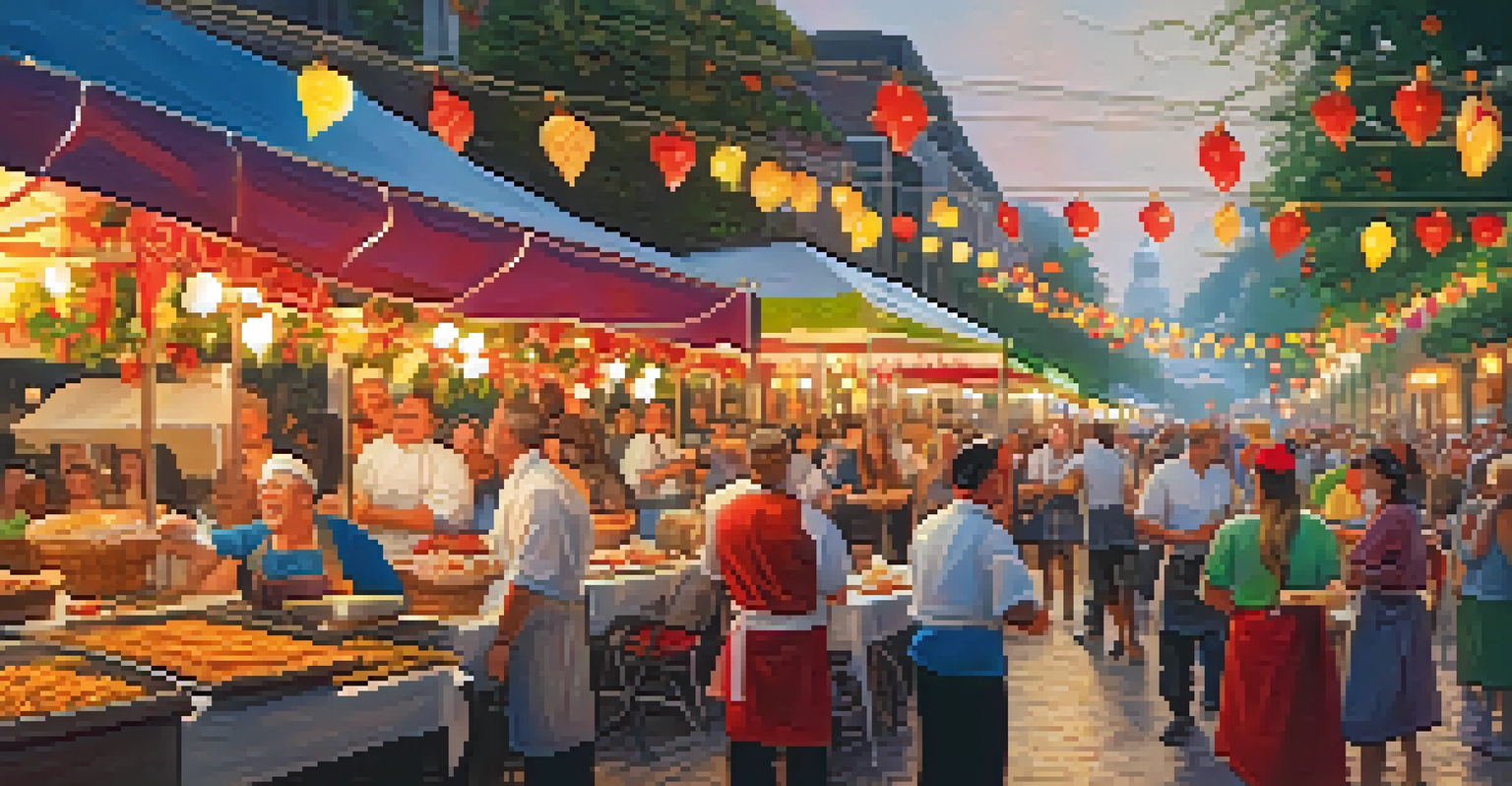Italian Contributions to New Orleans' Culinary Scene

The Italian Immigrant Influence on New Orleans Cuisine
The arrival of Italian immigrants in the late 19th century marked a significant shift in New Orleans' culinary landscape. They brought with them a wealth of flavors, techniques, and traditions that blended seamlessly with the city's existing Creole and Cajun influences. This melding created a vibrant tapestry of tastes that is distinctively New Orleans.
Food is the ingredient that binds us together.
As these immigrants settled into neighborhoods like the French Quarter and the Ninth Ward, they opened up restaurants, bakeries, and grocery stores, introducing locals to dishes like pasta, pizza, and gelato. These once-foreign foods quickly became staples in the community, showcasing the adaptability of Italian cuisine within the local palate. The incorporation of Italian ingredients into traditional Southern dishes paved the way for innovative culinary creations.
Furthermore, these Italian newcomers didn't just bring their food; they also shared their cooking methods and family recipes. This exchange of culinary knowledge helped to foster a sense of community and celebration around food, leading to the birth of iconic New Orleans dishes that we cherish today.
Classic Italian Dishes That Found a Home in New Orleans
One cannot discuss Italian contributions to New Orleans without mentioning the beloved gumbo z'herbes—a dish that beautifully marries Italian greens with traditional Cajun spices. This dish exemplifies how Italian cooks adapted their recipes to include local ingredients, resulting in a unique fusion that speaks to the heart of New Orleans cuisine.

Another classic is the muffuletta sandwich, a creation that showcases layers of Italian meats, cheeses, and a robust olive salad all encased in a round sesame loaf. This sandwich, originally inspired by Sicilian traditions, has become a quintessential New Orleans offering, representing both the Italian heritage and the city's vibrant food culture.
Italian Immigrants Shaped Cuisine
The arrival of Italian immigrants in the late 19th century transformed New Orleans' culinary landscape, blending their flavors with local Creole and Cajun traditions.
Additionally, Italian pastries like cannoli and sfogliatelle have made their mark on the dessert scene of New Orleans. Bakeries throughout the city often serve these sweet treats, further solidifying the Italian influence on the city's culinary identity.
The Role of Italian Markets and Grocery Stores
Italian markets and grocery stores have played a crucial role in the development of New Orleans' culinary scene. These establishments not only provided authentic Italian ingredients but also served as community hubs where locals could gather and share recipes, tips, and stories. The availability of high-quality olive oil, imported cheeses, and fresh pasta transformed home cooking for many families in the area.
Cooking is like love. It should be entered into with abandon or not at all.
For example, Central Grocery, established in 1906, is a historic Italian market known for its famous muffuletta sandwich. It has become a landmark of sorts, drawing both locals and tourists who are eager to sample an authentic taste of New Orleans’ Italian heritage. These markets have preserved the cultural significance of Italian cooking while allowing it to evolve in exciting ways.
Moreover, these markets often host events, cooking demonstrations, and tastings, fostering a sense of community and enthusiasm surrounding Italian cuisine. They serve as reminders of the enduring legacy of Italian immigrants and their profound impact on New Orleans' food culture.
Italian Festivals Celebrating Culinary Traditions
Festivals celebrating Italian heritage are a cornerstone of New Orleans' cultural calendar. Events like the Feast of the Ascension and the Italian Heritage Festival not only honor Italian traditions but also highlight the culinary contributions of the community. These festivals are a feast for the senses, showcasing a variety of traditional dishes, music, and art.
During these festivals, attendees can enjoy everything from freshly made pasta to delicious pastries, all while learning about the history and significance of each dish. It's a wonderful opportunity for people to come together, share their love for food, and appreciate the diverse influences that shape New Orleans cuisine.
Festivals Celebrate Italian Heritage
Italian festivals in New Orleans highlight the community's culinary contributions, bringing people together to enjoy traditional dishes and celebrate cultural history.
The vibrant atmosphere of these events fosters a sense of pride among the Italian community and encourages culinary exploration among attendees. These celebrations serve as a reminder of the lasting impact of Italian culture on the rich tapestry of New Orleans.
The Evolution of Italian Cuisine in New Orleans
Over the years, Italian cuisine in New Orleans has evolved, incorporating new flavors and techniques while still honoring traditional recipes. Chefs are now experimenting with local ingredients, leading to innovative dishes that push the boundaries of classic Italian cooking. This evolution reflects the dynamic nature of New Orleans as a culinary hub where creativity knows no bounds.
For instance, contemporary Italian restaurants in the city often feature dishes that combine Italian cooking techniques with Southern flavors, creating unique offerings that surprise and delight diners. This blend of culinary traditions ensures that Italian cuisine remains relevant and exciting in the ever-changing food landscape of New Orleans.
Moreover, many chefs with Italian heritage are now taking the lead in redefining what Italian cuisine means to their communities. They are not just preserving the past but also paving the way for future generations to explore and celebrate their culinary roots.
Famous Italian Chefs from New Orleans
New Orleans has produced a number of renowned chefs with Italian roots who have made significant contributions to the culinary scene. These chefs have become ambassadors of Italian cuisine, showcasing their heritage while also embracing local flavors. Their restaurants often serve as a testament to the rich culinary history of the city.
One notable chef is John Besh, who has received numerous accolades for his innovative approach to Italian cooking infused with Southern elements. His restaurants highlight the importance of local ingredients while paying homage to traditional Italian recipes, creating a harmonious blend that reflects the spirit of New Orleans cuisine.
Chefs Redefining Italian Cooking
Renowned chefs from New Orleans are innovating Italian cuisine by incorporating local ingredients and flavors, ensuring its evolution and relevance in the modern culinary scene.
Another chef, Alon Shaya, is known for his exceptional ability to marry Italian cooking with Southern influences, particularly through his celebrated restaurant, Domenica. His creative dishes and dedication to authenticity have solidified his reputation as a leading figure in the culinary world, further bridging the gap between Italian and New Orleans cuisine.
The Lasting Legacy of Italian Cuisine in New Orleans
The legacy of Italian cuisine in New Orleans is evident in the diverse array of dishes and culinary practices that have become staples of the city. From classic pastas to innovative desserts, the influence of Italian immigrants can be tasted in nearly every corner of the city. This lasting impact is a testament to the power of food as a unifying force.
As we explore the streets of New Orleans, we can see how Italian food has been embraced and celebrated by people of all backgrounds. The flavors of Italy have woven themselves into the very fabric of New Orleans cuisine, making it a true melting pot of culinary traditions.

Looking ahead, the future of Italian cuisine in New Orleans remains bright, with new generations of chefs and home cooks eager to explore and innovate while honoring their heritage. This ongoing journey will ensure that Italian contributions to the culinary scene continue to thrive for years to come.